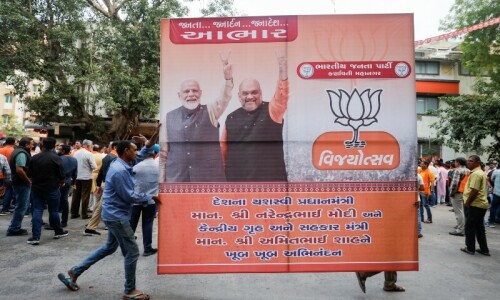India’s top court on Thursday struck down a scheme that allowed anonymous political donations in the form of electoral bonds, a critical ruling that comes ahead of national elections expected in April.
Electoral bonds have become a key method of political funding, allowing donors to give anonymously through certificates purchased from a bank, but transparency rights activists say the practice reduces accountability in the world’s biggest democracy.
Critics have condemned the campaign financing method as an opaque way to funnel “black money” to parties.
“The electoral bond scheme infringes upon the right of information of the voter,” the ruling said, read out by Chief Justice D.Y. Chandrachud.
“The information about the funding of political parties is essential for the effective exercise of the choice of voting”, it added.
Under the scheme, individuals or companies could buy electoral bonds at the government-owned State Bank of India (SBI).
The anonymous and tax-exempt bonds would then be handed to political parties and exchanged for cash.
Denominations range from 1,000 rupees ($12) to 10 million rupees ($120,000).
In addition to the concerns about the scheme allowing huge anonymous donations to parties, critics also feared it gave the government the power to access donor details through the state-owned SBI.
Political ‘mischief’
“The Supreme Court has struck down the Electoral Bond scheme and all the provisions that were made to bring it into effect,” said Prashant Bhushan, a lawyer representing the Association for Democratic Reforms (ADR) watchdog, one of the petitioners.
“They have held that this violates the fundamental right to information of citizens to know about who is contributing money to political parties,” he told reporters outside the Supreme Court in New Delhi.
“They have also struck down the unlimited contribution being made by companies to political parties.”
Opposition Congress party leader Rahul Gandhi welcomed the judgement, accusing Prime Minister Narendra Modi’s Bharatiya Janata Party (BJP) of using the bond system as a “medium for taking bribes and commission”.
ADR co-founder Jagdeep Chhokar said the ruling would help end political “mischief”.
“My initial reaction is of big relief — and some hope,” he said, adding that the bond system “had added an extra layer of opacity”.
Electoral bonds were first sold in 2018. In the period 2021-22, ADR calculated that more than half of all donations received by political parties used the scheme.
Modi’s party has previously defended electoral bonds, arguing the process is more transparent than direct cash donations because it is channelled through the banking system.
Cash donations are still allowed, but carry no tax exemption.
In the 2019 general elections, spending by candidates and political parties ran up to $8.7 billion, according to the New Delhi-based Centre for Media Studies.















































Dear visitor, the comments section is undergoing an overhaul and will return soon.